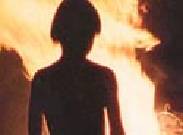|
|
||||
|
|
by Donald Levit  The catastrophe is often of humanity's doing, and thus at least superficially cautionary. The treatment may well be more or less via science fiction -- with results ranging from numbing to camp to decent pulp to admonitory social comment. To rattle off a starter's list is hardly a challenge: The Day the Earth Caught Fire, Day the World Ended (remade as Year 2889), On the Beach, The Last Man on Earth and The Omega Man (both from Richard Matheson's I Am Legend), twice-made Lord of the Flies, Planet of the Apes, The Day After. "Post-Apocalyptic" is too glorified a compound, since these day(s)-after considerations mostly have little real bite left. Still, it's a pity that director Michael Haneke's initially interesting script for, and realization of, Time of the Wolf/Le temps du loup/Wolfzeit grinds to near standstill to avoid "a message to send out, a formula for resolving the problem." His title from the oldest Germanic poem, describing the period prior to "Ragnarök" or world's end, he consciously seeks not to exaggerate, which "leads to implausibility," but, rather, realistically to picture the state of a remnant of French mankind following some unnamed cataclysm. Reduced to wanderers' tales and news (never overheard) from weak-batteried radios, no one is aware of much, as survival is conditioned like that of animals, to getting food, water, shelter and sex as one can, protecting the young, bowing to the strong. Since these are Homo sapiens, they can also seek rough redress, pencil letters to the dead, entertain undefined hopes and half-believe in the thirty-six Just who supposedly bring enlightenment. Not "a disaster movie: there are plenty of those already," after simple white-on-black opening credits which are matched at the end, the story begins well enough, with Georges (Daniel Duval) and Anne (Isabelle Huppert) Laurent along with young Eva (Anaďs Demoustier) and younger freckled Ben (Lucas Biscombe) unloading a Peugeot 806 at their weekend retreat. The cabin, however, has been appropriated by another nuclear family, frightened and armed, and Anne is soon running through deserted, foggy nighttime countryside with her children. Dark throughout in all senses, the film follows the three as they flee from blood, through a flamelit world, to another existence among a society that has been decimated and reduced, as well. Pushing a bicycle and trailing behind a surly, young, androgynous Runaway (Hakim Taleb), they join a small, mixed non-communicative group huddled in an abandoned railway depot. Slowly moving trains, in fact, seem the one miracle and only connection with an "outside," but they rarely pass and, in any case, do not bother to brake. In a land of mules and horses, rifle-toting leaders and barter for life's essentials, many others show up and, in the crowding, tensions and clashes mount. Emotions are dulled, faces deadpan, little is developed and hardly anything revealed about characters, too many, too brief. Anne herself is shunted to a bit personality, and what had hinted between her sensitive daughter and the amoral Runaway does not deliver. Seven or eight years old, Ben makes a last, child's gesture that is generous but misguided; the instinct that rescues him is meant to convey something, possibly man's love, but too much has gone by, with little resolution, and the view from a smooth-riding clacking train cannot rescue the vehicle. In underplaying what exactly has gone before, and in its darkness and feel of dumb resignation, Time of the Wolf allows itself room to gather focus. Unfortunately, the film --one of fifteen selections in the annual "Rendez-Vous with French Cinema" at Lincoln Center -- squanders the opportunity. Slow and inadequately concentrated, it is unsure of what goal, if any, lies ahead. Initial mystery forgotten, subsequent relationships insufficiently developed, the film dissolves in a lack of sharpness. (Released by Palm Pictures; not rated by MPAA.) |
||
|
© 2024 - ReelTalk Movie Reviews Website designed by Dot Pitch Studios, LLC |



